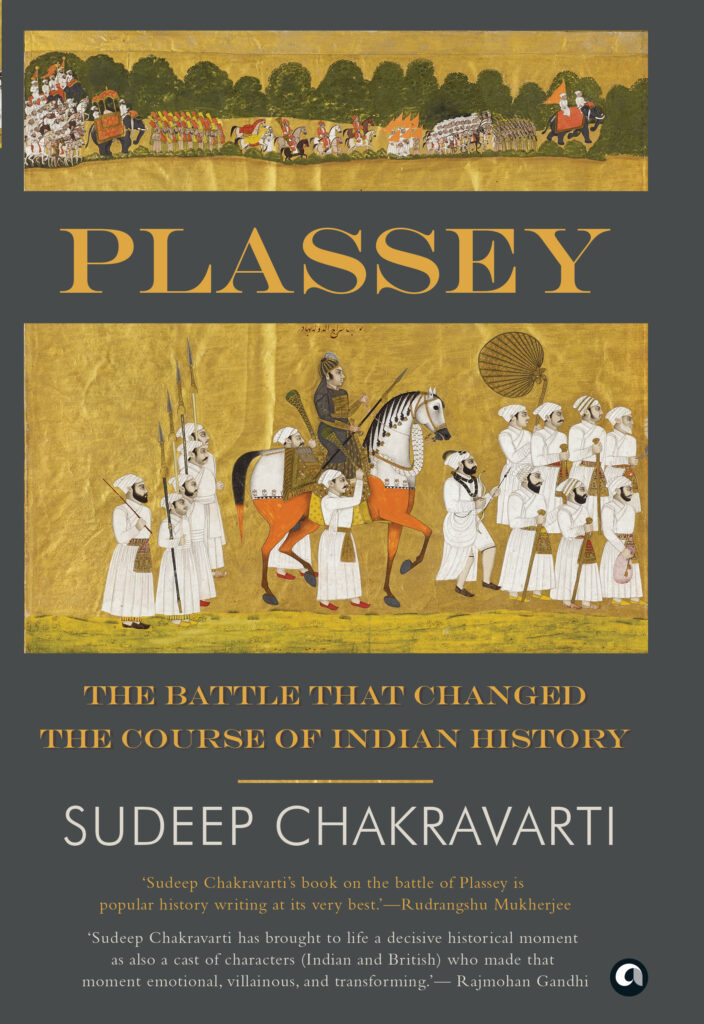
Book Review, “Plassey: The Battle that changed the course of Indian History”
The book was authored by senior columnist & author, Sudeep Chakravarty, and published by Aleph Book Company. It was released in January, 2020. Here is a succinct readers review of the account.
The year is 1756. It’s been nearly fifty years since the death of the last great Mughal emperor Aurangzeb. The Indian political terrain has changed faster than expected. The throne of Delhi was weak and overshadowed by its minister Imad ul Mulk.
In Bengal, one of the most prosperous provinces of the Empire, the things couldn’t be more different. It is here that trade flourishes like the Sundarbans. The Dutch, the English, the French all have their factories here. There were Portuguese and Armenian merchants too. And they all compete ferociously for the prize that was Bengal. The relationship between the regime and the companies can be termed as an uneasy peace at best. But trouble was brewing. In 1756, the Nawab Alivardi Khan, died and left the masnad to his grandson, Siraj ud Daulah. Siraj was young and fierce. From his seat in Murshidabad, the young successor of Alivardi Khan finds that his power isn’t entirely unchallenged.
I recently hosted a book talk with author Sudeep Chakravarty. Its well written account, that reads like a story, even though it has balanced its academic rigor. I started reading the book on the 1st of July, lazily going through the introduction. I must say, initially, it seemed a little dense to me. The sentence structures were anything but usual. But as soon as I got past it, and the context started building up, I just couldn’t stop reading. The book is divided into 3 sections, and it basically builds with a background, the characters, ending with the actual battle. It got so consuming, that I finished a 400 page non-fiction book in four days. The final day, I was up reading it all night, bringing up the reading time for that day to 9 hours! So why should Plassey matter? Because it is a battle, that changed the entire course of modern Indian history. From 1757 onward, we saw the rising domination of the British, both Company and Crown. It brought out a clear message- The British way of expansion, militarily, commercially, and even politically stamped its superiority upon the Indian milieu. As puppet Nawabs later on were installed by the British, starting with Mir Jafar, the company was able to extract outstanding sums from Bengal, all of which did not come from trade. In 1764, the British won the battle of Buxar, pitted against the combined forces of the ruling Nawab, the Mughal emperor and the Nawab of Awadh. A rather easy victory. The treaty of Allahabad later on provided the British with diwani rights, which allowed the company to collect taxes in Bengal, in place of the Nawab, giving back a small sum in exchange. This went on for a few years, till the Company formally took over politically. There was a disastrous famine in Bengal, in the year 1770, which is said to have killed people numbering in the millions. A lot of blame for this havoc can be apportioned to the British and their policies. This was the first example, of how India was to be for nearly 200 years to come. The fat cow that India was, was sucked dry. Some even go as far as to call it the rape of India. That is where Plassey holds its importance. The beginning of the end. How it happened. How it could have been different. How the rulers before were much better than the rulers to come. Indeed, Sudeep Chakravarti’s work is a study in the appreciation of the Nawabs of Bengal. It is also a repudiation of the many myths that surround it’s protagonist – Siraj ud Daulah. It also throws light on the figure of Robert Clive. By the end, this theme, Siraj vs Clive, was the only frame encompassing my mind. As we see in the book, Siraj was not the sadistic alcoholic that he is made out to be. We see a man contesting for the throne, that is literally surrounded by vultures. A man who in his human capacity is deeply struggling with a balancing act. He is able to defeat the first challenge to his throne, that of Shaukat Jung of Purnea, to which the vultures express their shock and turn to someone they don’t fully understand. Siraj wasn’t a pliant man. He wanted the Company fortifications down, and he battled them for it, evicting every Company man out of Fort William. We also see how contentious became the incident of black hole.
Enter Clive. A man who had aspersions cast on him since childhood, happens to rise through the ranks of the company quite swiftly. No, it wasn’t luck. His energies were very well directed. As was his talent for decisive action. During the battle of Calcutta, not only was he able to defend his position well, he even alarmed the Nawab, by turning the tide and launching an attack against him. He seems to have enjoyed the loyalty of his men, which is by no means a small feat. He also seems to have been able to turn the loyalty of the Nawab’s men, which really helped change the course of the battle. In the subsequent treaty of Alinagar, Clive won back the trading rights and was not intent upon eradication the French from Bengali soil. This is where we see an interesting turn of events. We have three parties, The British, The French and the Nawab. It was such a mire of confusion, traitors and mistrust, that an easily affordable alliance of the French and the Nawab never happened. Owing to this, and the traitors, the French factory at Chandernagore was destroyed. Most of the French were exiled. A 24 year old Siraj, had no one to counsel him in one of the most challenging moments in his life. With traitors, he went to battle at Plassey, and lost. With bad luck, he scampered and was killed. An equally anxious Clive, with the stars aligning for him perfectly well, along with the conspirators, was able to win such a decisive battle in a matter of hours. I agree, Clive was way more focused and tenacious than Siraj. But at least he didn’t have to watch his back.

Source: https://www.npg.org.uk/collections/search/portrait/mw01347/Robert-Clive-and-Mir-Jafar-after-the-Battle-of-Plassey-1757
The story of Plassey is a compelling tale of how conspiracy is not always a theory. Also, it is instructive in the manner of empire. How no one needs more enemies than he can handle. How a Siraj with more friends, could have easily defeated a Clive, with a little less expediency.
The Book talk is available on the YouTube channel of Tawarikh Khwani. The conversation with Sudeep Ji is nothing less than a consuming journey into the past. Please find below the links to it.
Aamir Khan is currently doing his doctorate in History. He is also a passionate lover of Urdu Poetry. He runs a forum "urdu.daan" on Instagram, Anchor & You Tube to share his own poetries & recitations of prominent Urdu poets.

